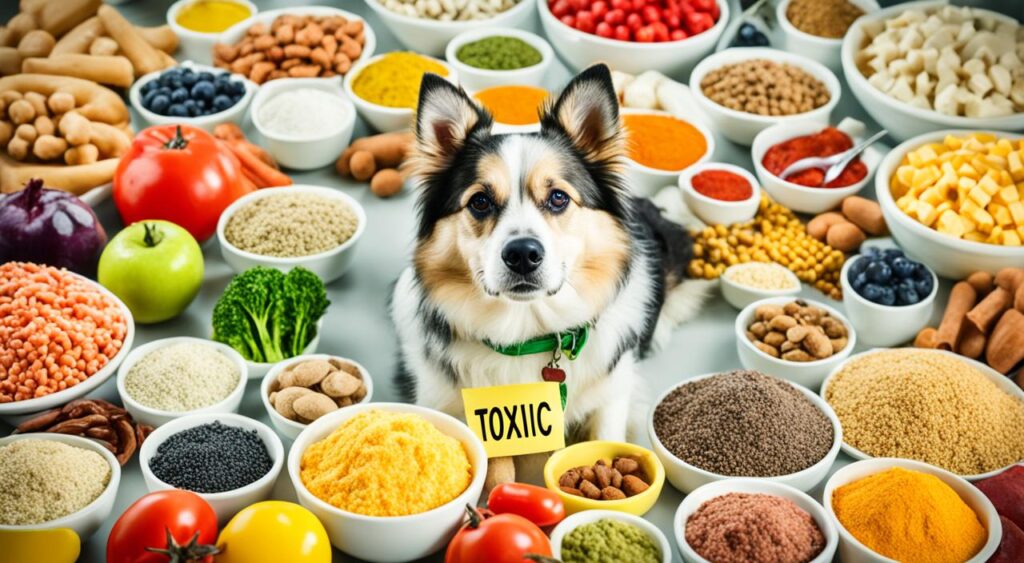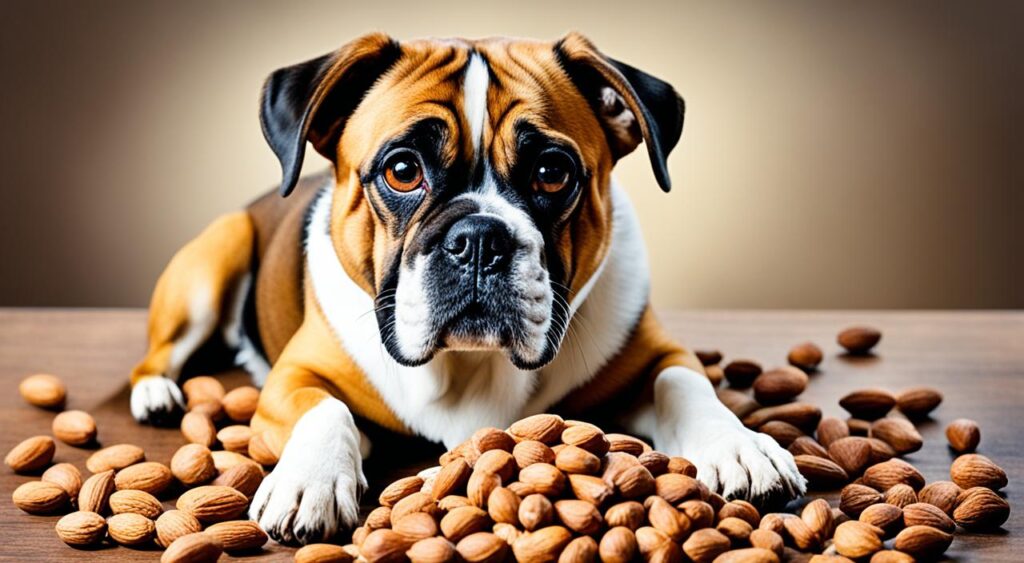
As a responsible pet owner, it’s key to know which foods are toxic to dogs. Many foods safe for humans can be harmful or even deadly to dogs. For example, avocados and xylitol are safe for us but not for dogs. The ASPCA reports many calls about dogs eating these harmful foods.
Knowing what dogs can’t eat helps prevent health problems and keeps them happy. We’ll explore more about toxic foods and substances that can harm your pet.
Being aware of what dogs should not eat can prevent accidents. This ensures a long, healthy life for your dogs. Let’s look into the different toxic foods and substances that can harm your pet.
Key Takeaways
- Many common foods like chocolate, grapes, and xylitol are toxic to dogs.
- Understanding what dogs should not eat is fundamental for pet safety.
- Statistics show that ingestion of toxic foods results in numerous emergency calls yearly.
- Some seemingly safe items for humans can result in severe health issues for dogs.
- Stay informed about harmful foods for dogs to keep your pet safe.
Understanding Toxic Foods for Dogs
Many foods can be harmful to dogs, even things found in our kitchens. It’s crucial for owners to know what’s toxic to dogs. Some foods might seem safe but can actually be dangerous.
Xylitol, a sweetener in sugar-free products, is very dangerous for dogs. It can cause insulin spikes and even liver failure. Grapes and raisins can lead to kidney failure and make dogs vomit or eat less.
Avocado has a toxin called persin in its skin and pit. This can make dogs vomit or have diarrhea.
Tomatoes are also harmful, especially the green parts, which have solanine. This can cause breathing problems and stomach pain. Fruits with seeds or pits, like apples and cherries, can be dangerous. They can choke a dog or have toxins.
Lemons have a lot of citric acid, which can cause rashes and stomach problems in dogs.
The onion family, including garlic, is very toxic to dogs. It can cause anemia. Foods like rhubarb, macadamia nuts, and raw bread dough can also harm dogs. They can cause kidney damage or stomach problems.
Owners need to watch out for dangerous items at home. Knowing what foods are toxic to dogs helps protect them from harm.
Common Dangerous Foods for Dogs
Many pet owners may not know what is toxic to dogs. Foods like chocolate can cause serious health issues. Chocolate has methylxanthines that lead to vomiting, diarrhea, and seizures in dogs. Even a small amount can be deadly, showing why it’s key to know what dogs should not eat.
Grapes and raisins are also harmful. They have a toxin that can cause acute kidney failure. Just a few can lead to severe health problems, making them a big concern for pet owners. Avocados have persin, causing vomiting and diarrhea. Xylitol in sugar-free gums and candies can cause hypoglycemia and liver failure in dogs.
Other dangers include alcohol, which can seriously intoxicate dogs. Cooked bones can splinter and cause constipation or gut perforation. Raw or undercooked meat and eggs can have Salmonella bacteria. Onions and garlic can damage red blood cells, leading to anemia.
Here is a summary of some of the most common dangerous foods for dogs:
| Food | Effects on Dogs |
|---|---|
| Chocolate | Vomiting, diarrhea, seizures |
| Grapes/Raisins | Kidney failure |
| Avocado | Vomiting, diarrhea |
| Xylitol | Hypoglycemia, liver failure |
| Alcohol | Intoxication, vomiting, coma |
| Cooked Bones | Constipation, gut perforation |
| Onions/Garlic | Anemia, gastrointestinal irritation |
| Raw Meat/Eggs | Risk of Salmonella |
It’s crucial for dog owners to know about these dangerous foods. Keeping them away can save a dog’s life. Always check with a vet if unsure about what dogs should not eat.
What Should Dogs Not Eat: A Comprehensive List
It’s crucial for dog owners to know which foods are harmful. Some foods can seriously harm a dog’s health, leading to bad reactions. We’ll look at some dangerous substances, like xylitol and chocolate, which are often overlooked but very dangerous.
Xylitol and Its Effects on Dogs
Xylitol is in sugar-free gum and mouthwash and can be very bad for dogs. If a dog eats it, it can make insulin levels go up too fast. This can cause hypoglycemia, which can make a dog tired, have seizures, or even die. Dogs need quick help from a vet if they eat xylitol. Always read labels to keep your pet safe from these dangers.
Harmful Effects of Chocolate and Caffeine
Chocolate is a big no-no for dogs, even though people love it. It has theobromine and caffeine that dogs can’t handle well. Eating chocolate can make a dog throw up, get agitated, and even have seizures. The bad effects of chocolate can be deadly, so keep it away from your pet.
| Food | Toxicity Level | Potential Effects |
|---|---|---|
| Xylitol | High | Hypoglycemia, liver failure |
| Chocolate | High | Vomiting, seizures, death |
| Onions | High | Anemia, gastrointestinal upset |
| Macadamia Nuts | High | Muscle weakness, tremors |
| Avocado | High | Fluid accumulation, breathing issues |
Vegetables That Are Toxic to Dogs
It’s important for pet owners to know which vegetables can harm dogs. Some veggies can cause serious health issues. Onions and garlic are especially dangerous because they can harm a dog’s red blood cells. This can lead to anemia and stomach problems.
The Risks of Onions and Garlic
Onions and garlic are harmful to dogs because of a compound called thiosulfate. Dogs can’t process this well. Both raw and cooked onions or garlic can damage red blood cells. This can make dogs weak, tired, and have stomach issues.
Other Harmful Vegetables
There are other veggies that are bad for dogs too. Here are some to avoid:
- Mushrooms: Some mushrooms can make dogs very sick, causing vomiting and seizures.
- Rhubarb: It has oxalates that can hurt the nervous system and kidneys.
- Avocado: Avocados have persin, which can make some dogs vomit and have diarrhea.
- Corn on the cob: The cob can block the intestines.
- Potatoes: Raw, green potatoes are toxic and can cause serious health problems.
Always talk to a vet before giving your dog new foods. For more info on safe foods for dogs, check this link.
Fruits That Are Unsafe for Dogs
Feeding our furry friends the right foods is key. Some fruits might look healthy but can be harmful. Grapes and raisins are a big concern for dogs. Knowing what dogs should not eat keeps them safe.
Grapes and Raisins: A Hidden Danger
Grapes and raisins can cause kidney failure in dogs. Even a little bit can lead to serious health problems. This makes them very dangerous for dogs.
The exact toxin in grapes and raisins is still unknown. But the effects on dogs are clear.
Symptoms of grape and raisin poisoning include:
- Vomiting
- Diarrhea
- Lethargy
- Seizures
- Constipation
If a dog eats these toxic fruits, quick action is needed. Treatment might include activated charcoal, medicine, or tests. Dog owners should always have vet poison control numbers ready.
Nuts and Their Risks to Dogs
It’s crucial for pet owners to know the risks of nuts for dogs. Some nuts are okay in small amounts, but others can be very harmful. This part explains why macadamia nuts are especially bad for dogs and lists other nuts to avoid.
Why Macadamia Nuts Are Harmful
Macadamia nuts are very dangerous for dogs. Eating just one can cause serious problems, like:
- Weakness
- Vomiting
- Tremors
- Hyperthermia
These issues can start within hours after eating them. Dogs need to see a vet right away. The toxins in these nuts mess with a dog’s brain, causing these bad symptoms.
Other Nuts to Avoid
There are more nuts that are bad for dogs, besides macadamia nuts. Here’s a list of nuts to stay away from and why:
| Nut Type | Dangers |
|---|---|
| Black Walnuts | Can cause vomiting and neurological symptoms |
| Pecans | Risk of seizures, gastrointestinal distress due to molds |
| Pistachios | High fat content, potential choking hazard |
| Almonds | Choking hazard, high fat, risk for pancreatitis |
| Raw Cashews | Toxic; digestive difficulties in dogs |
But not all nuts are bad. Peanuts and roasted cashews (without shells) are usually safe in small amounts. Hazelnuts can be given carefully, but be careful. Avoid giving dogs flavored or salted nuts. Knowing what should dogs not eat means understanding the dangers of nuts.

Understanding Household Items Poisonous to Dogs
Many household items can be dangerous to dogs. This includes common medicines and foods found in kitchens. Knowing about these dangers can help keep pets safe.
Common Medications and How They Affect Dogs
Some medicines are toxic to dogs and can cause serious health problems. Items like acetaminophen, ibuprofen, and aspirin are harmful if dogs eat them. Dogs may show signs like vomiting, feeling very tired, or even death in bad cases.
It’s important to keep these items away from pets. For more info on what to avoid, check out this resource.
Everyday Foods That Are Harmful
Some everyday foods can be bad for dogs too. Foods like chocolate, caffeine, grapes, raisins, and xylitol can cause serious health issues. These include vomiting, diarrhea, or even organ failure.
It’s key for pet owners to know which foods are safe and which aren’t. Avoiding harmful foods helps keep pets safe at home.
| Common Substances | Potential Risks |
|---|---|
| Alcohol | Severe toxicity leading to coma or death |
| Xylitol | Can cause hypoglycemia and liver failure |
| Onions & Garlic | Can damage red blood cells, causing anemia |
| Grapes & Raisins | Possible kidney failure in dogs |
| Chocolate | Neurotoxic effects, may lead to seizures |
| Acetaminophen | Can result in liver damage |
| Raw Dough | Can cause stomach bloating and twisting |
Symptoms of Poisoning in Dogs
It’s crucial for pet owners to know the signs of poisoning in dogs. They should watch for signs that show their dog might have eaten something bad. Common signs include:
- Vomiting
- Lethargy
- Seizures
- Difficulty breathing or wheezing
- Changes in body temperature
- Gastrointestinal upset, such as diarrhea
About 70% of dog poison cases show stomach problems. Watching your pet for these signs helps get them help fast. More than 40% have changes in their mouth’s color or feel, and 15% swell up in the face or legs.
Long-term, poisoning can lead to serious issues like kidney or liver failure. Spotting these signs early can really help. If you think your dog ate something bad, call the ASPCA at (888) 426-4435 or Pet Poison Helpline at (855) 764-7661. Quick action is key to saving your dog and keeping them safe from bad food.
Conclusion
It’s key to know which foods are bad for dogs to keep them safe and healthy. By learning about these foods, pet owners can stop their dogs from eating things that could harm them. This knowledge helps prevent serious health problems or even death.
If a dog eats something toxic, act fast. Call a vet right away to help your dog. Keeping up with what foods are bad for dogs helps make a safe home for pets. It also keeps everyone, including pets, safe and happy.
For a good diet, think about PawCo’s vegan dog food. It’s a safe and healthy choice that avoids bad ingredients. A balanced diet is key to good health and stops the bad effects of toxic foods. Learn more about this at keeping your pup safe.
